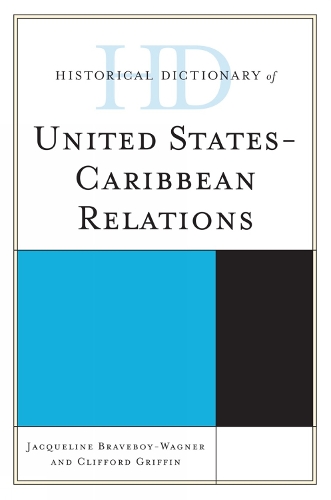
Historical Dictionary of United States-Caribbean Relations
(Hardback)
Publishing Details
Historical Dictionary of United States-Caribbean Relations
By (Author) Jacqueline Braveboy-Wagner
By (author) Clifford Griffin
Bloomsbury Publishing PLC
Rowman & Littlefield Publishers
18th July 2017
United States
Classifications
General
Non Fiction
Dictionaries
327.7291073
Physical Properties
Hardback
236
Width 159mm, Height 239mm, Spine 23mm
535g
Description
The relationship between the worlds largest power and the small nations of the Caribbean has been and remains rich and varied. The history of political and security collaboration is long, if not untroubled: the United States is the Caribbeans predominant trade and investment partner, and U.S. culture is as pervasive in the region as are U.S. goods. At the same time, the proximity, smallness, and economic dependence of these countries have all contributed to a tendency for the United States to seek to dominate the region, often enough by resort to hard power. From the nineteenth century through the Cold War, the United States has resorted to military interventions and coercive diplomacy to ensure that this region, so close to its shores, remains stable and friendly. The Historical Dictionary of United States-Caribbean Relations contains a chronology, an introduction, appendixes, and an extensive bibliography. The dictionary section has over 700 cross-referenced entries on important personalities, politics, economy, foreign relations, religion, and culture.
Reviews
The relationship with the small Caribbean nations and their bigger neighbor to the North has been both a source of conflict and enlightenment. While U.S. culture and manufactured goods dominate the region, the relationship between the two parties has been a rocky one over the past three centuries. This excellent historical dictionary treats each topic in a uniform, unbiased fashion. Topics include, among others: Bay of Pigs Invasion, Eric Matthew Gairy, Papa Doc, Guantanamo Bay, Congress of Vienna, Jimmy Carter, Donald Trump, Che Guevara, and the Caribbean Diaspora. Also included is a collection of topics under the theme United States, Interventions in which chronicles more direct attempts by Washington to influence local political outcomes in the region. In addition to the historical dictionary section, the authors have provided a map, acronyms and abbreviations, a chronology, a 21-page introduction, a bibliography, and the text of historical documents.... Overall this is a handy guide to United States-Caribbean relations that will provide basic information on topics of interest. * American Reference Books Annual *
Author Bio
Jacqueline Braveboy-Wagner is Professor of Political Science in the Colin Powell School of Civic and Global Leadership at the City College and Professor in the Graduate School and University Center of the City University of New York. She is a specialist in foreign policy, diplomacy and development, particularly with respect to small states (and specifically Caribbean states) as well as the nations of the global south in general. Clifford E. Griffin is Associate Professor at North Carolina State University, teaching in the Department of Political Science, School of Public & International Affairs, College of Humanities and Social Sciences. His ongoing collaborations include a University of London Institute of the Americas research project on the role of Westminster in the Caribbean and two projects with the University of So Paulo on building democracy.
